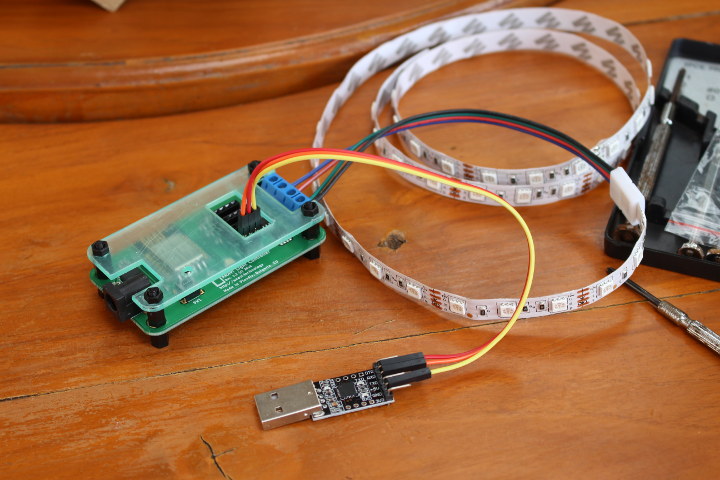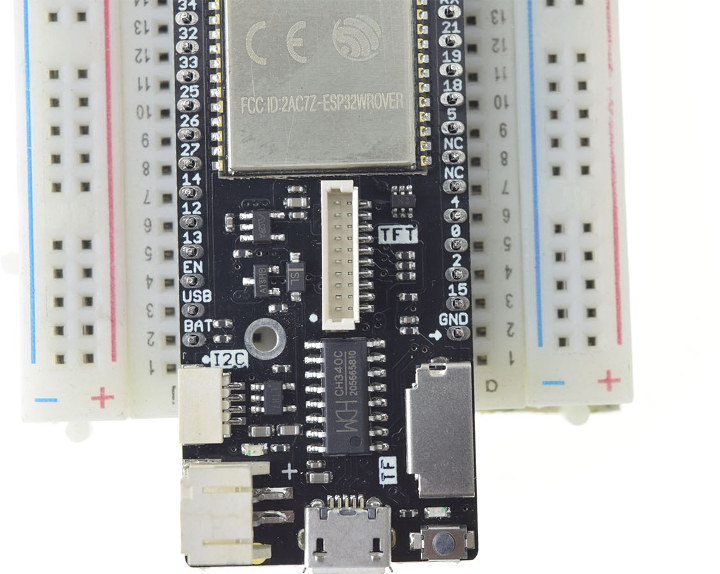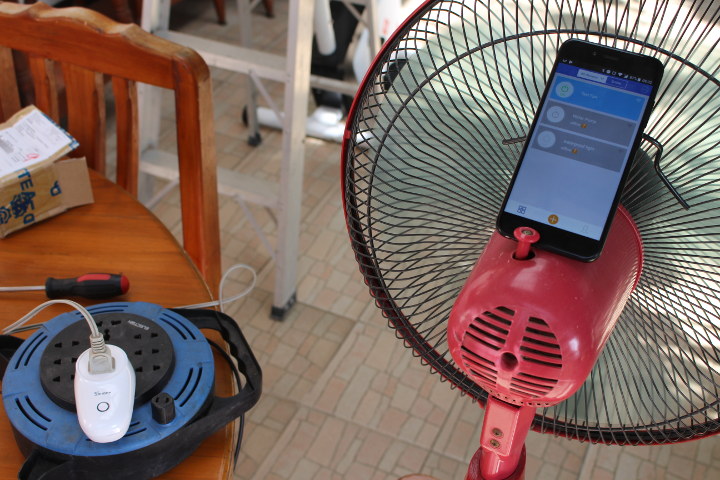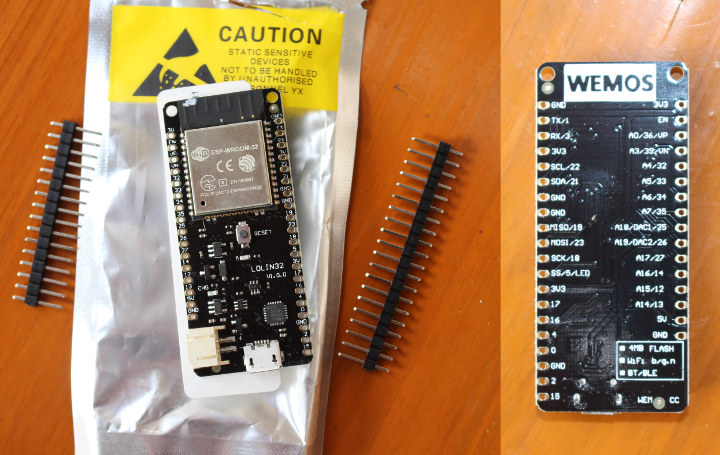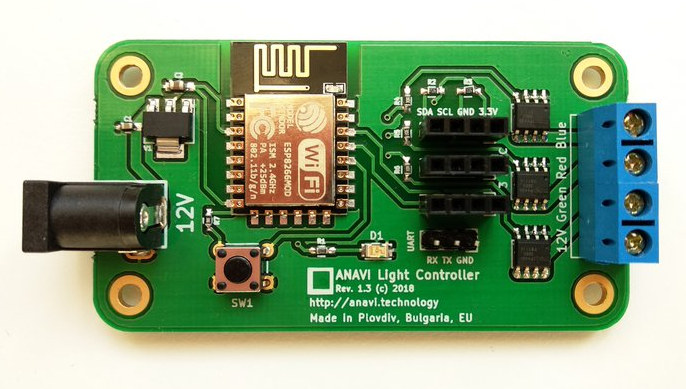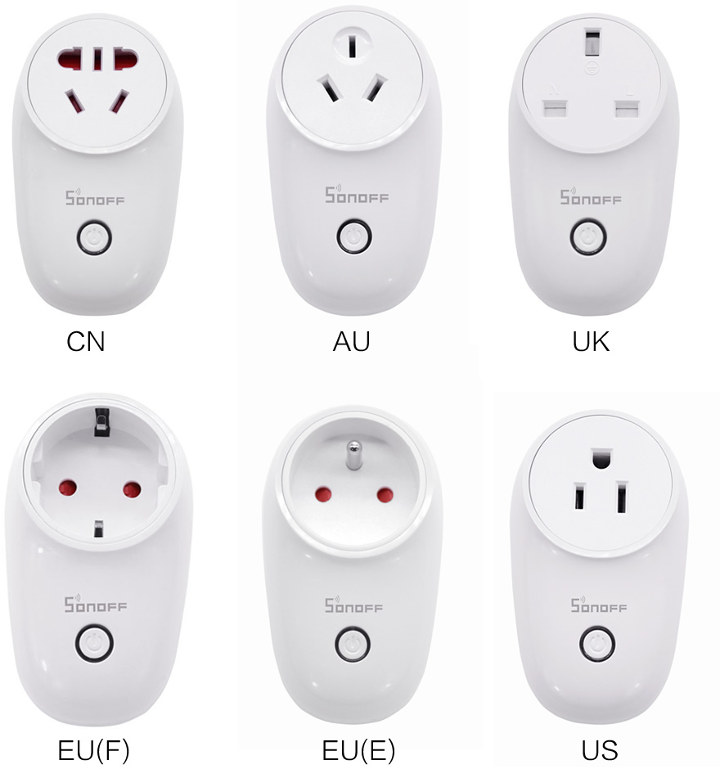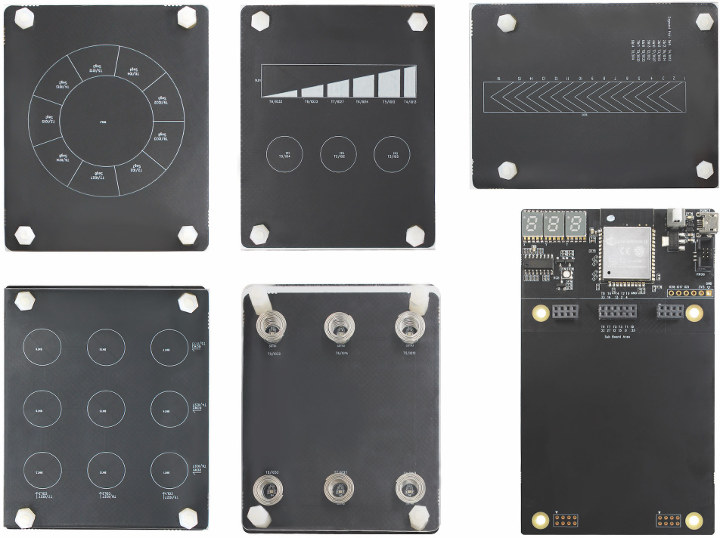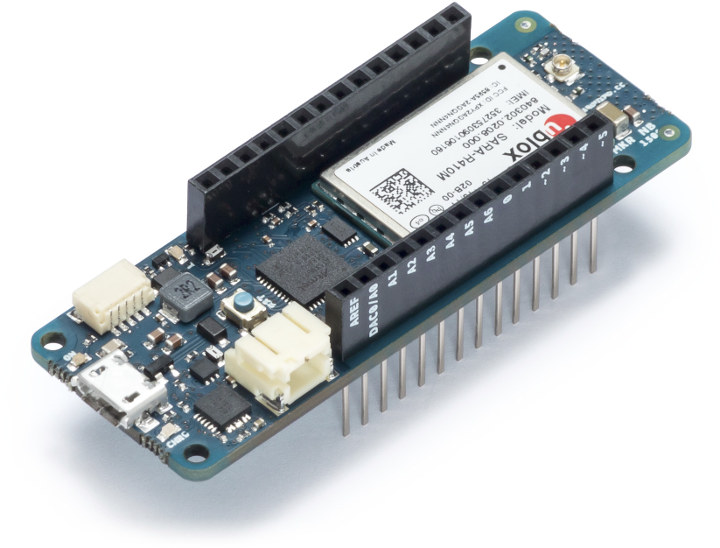A few months ago I reviewed ANAVI Light pHat for Raspberry Pi which allows you to control an LED RGB strip from the popular development board. However, if all you need is to switch the RGB LED light on and off, or change the color, the hardware is clearly overpowered for the tasks. So Leon ANAVI designed another board based on ESP8266 – ANAVI Light Controller – which does the same thing with lower cost and more power efficient hardware. Leon sent me a sample for review, so let’s see what we’ve got. ANAVI Light Controller Starter Kit Unboxing I received a package for the Starter kit that’s offered for $39 on CrowdSupply. We’ve got the main board, a USB debugging, an acrylic enclosure with screws and spacers, a one meter RGB LED strip, and some stickers inside the package. If we have a close look at the board we […]
Wemos LOLIN D32 Pro ESP32 Board Supports TFT Displays, Comes with a micro SD Card Slot
Wemos is popular for their low cost WiFi board based on Espressif SoCs. Their most popular board is ESP8266 based Wemos D1 mini thanks to its compact form factor, low price ($5 shipped), and available add-on boards. But they’ve also launched some ESP32 in the last year or so with development boards such as Wemos LOLIN32 Lite. Their latest ESP32 board – LOLIN D32 Pro v2.00 – features ESP32-WROVER module, and beside exposing I/Os via breadboard compatible headers, also offers a micro SD card slot, a TFT display connector, and an I2C header. LOLIN D32 Pro specifications: Wireless module – ESP32-WROVER 802.11 b/g/n WiFi + Bluetooth 4.1 LE module with 4MB Flash, 4MB PSRAM Storage – micro SD card slot supporting SPI mode Display I/F – TFT display connector USB – 1x micro USB port for programming and power Expansion 2x 16-pin headers with GPIOs, SPI, I2C, UART, ADC, DAC, […]
Sonoff S26 Smart Socket Mini Review & Teardown
ITEAD Studio very recently launched their Sonoff S26 WiFi Smart plug as a more compact and cost effective upgrade to their Sonoff S20 smart sockets, and which comes in 6 different versions for China, Australia, the United Kingdom, the United States, Europe type F for Germany, Austria, the Netherlands, Sweden, Finland, Norway, Portugal, Spain and Eastern Europe, and Europe type E for France, Belgium, Poland, Slovakia, the Czech Republic, Tunisia and Morocco. You can find the one that suits you most on World Standard website. I was interested in getting the device, mostly to check the hardware design, so the company sent me one sample to try out. Sonoff S26 Unboxing Sonoff S26 comes is a white package with Sonoff branding. I received the US type plug (S26B model) which includes a ground pin on both side, so it’s not suitable for most sockets here in Thailand that do not […]
My Attempt at Getting Started with Zephyr Project OS on ESP32
Zephyr Project is a real-time operating systems for the Internet of Things (IoT) that was introduced in early 2016, and supported/hosted by the Linux Foundation. It runs on a fairly large number of MCU boards from different architecture (x86, Arm, RISC-V, etc..), and Linaro even launched 96boards IoT compliant hardware like BLE Carbon board that are designed to run Zephyr Project. More recently, Linaro CEO revealed several commercial products are shipping with Zephyr Project OS, so I thought it might be a good time to give it a try. Target Board – Wemos Lolin32 I only had STM32 Bluepill, and some ESP32 boards, so I went with the latter since it comes with WiFi. But instead of re-using some of my existing boards, I asked Banggood whether they could send Wemos Lolin32, which they did. They sell it for $7.99 shipped, but any other ESP32 board should do. The board […]
ESP8266 based ANAVI Light Controller can be Programmed with Home Assistant or the Arduino IDE (Crowdfunding)
ANAVI Technology previously launched a Light pHAT allowing for RGB Light strip connection to Raspberry Pi boards, and during my review of ANAVI Light pHAT with Raspberry Pi 2, it did the job, but if that’s all you want to do, the Raspberry Pi board is clearly oversized & overpowered for the job. So Leon ANAVI got back to the drawing board and designed a similar open source hardware board – called ANAVI Light Controller – with an built-in ESP8266 module that removes the need for a fully fledged Linux board. ANAVI Light Controller specifications: Wireless Module – ESP8266MOD module based on ESP8266 Tensilica L106 32-bit processor Connectivity – WiFi 802.11 b/g/n Expansion Terminal block for 12 V RGB LED strip 3x I2C headers for sensors Debugging – UART header Misc – Button Power Supply – 12 V via power barrel jack Dimensions – 75 mm x 40 mm Certification […]
Sonoff S26 WiFi Smart Plug Works in All/Most Countries, Sells for under $10
One recurring issue with smart plugs / sockets is that they are often designed with a specific prong type, so if you want to use them in our country you may have to add an adapter, which may not be ideal, since the socket may fall off or have bad contact. Sonoff S26 WiFi smart plug solves that issue as ITEAD Studio made it available in six different versions for China, Australia, United Kingdom, Europe type F, Europe type E, and the United States. Sonoff S26 specifications: Standard – US/ UK/ CN/AU/ EU(type F/E) Power supply – 90V~250V AC @ 50/60Hz Max. Current – 10A Max power – 2200W Connectivity – 802.11.b/g/n 2.4G WiFi with WEP/TKIP/AES encyprtion, WPA-PSK/WPA2-PSK security Dimensions – 104 x 55 x 73 mm (Fire Retardant ABS enclosure) Weight – 130 grams Temperature Range – 0ºC-40ºC Humidity- 5%-90%RH, Non-condensing Certification – CE Just like other Sonoff devices, […]
ESP32-Sense Kit Lets You Experiment with ESP32 Touch Interface
Beside support for Bluetooth, one the other extra benefits of Espressif ESP32 over ESP8266 is the presence of a touch interface in the newer processor. If you are interested in that specific features, Espressif Systems has worked on ESP32-Sense kit that provides a main board with ESP32, and several touch enabled daughter boards. Board descriptions in the kit: Motherboard with ESP32 module (ESP-WROOM-32), a 3-digit display unit, a debug unit, USB port for power, switches, an RGB LED, and expansion headers. 5 daughterboard: linear slider duplex slider wheel slider matrix buttons spring buttons. Developers could even design and add their own daughterboards to connect to the motherboard’s touch header. A good way to get started with your own board is to check out ESP32 Sense Kit reference design files with Cadence/OrCAD Capture V16.6 schematics, and Mentor Graphics/Pads VⅩ.2 PCB layout files. But if you are just interested in the software […]
Arduino Introduces Two New IoT Boards – MKR WiFi 1010 (ESP32) and MKR NB 1500 (NB-IoT + eMTC)
Arduino introduced its MKR family of breadboard compatible maker boards with MKR1000 featuring an Atmel SAMD21 microcontroller combined with a Microchip WINC1500 WiFi module. The board was followed by MRKZero without wireless connectivity, then MKRFOX1200 Sigfox board, and finally MKR WAN 1300 & MKR GSM 1400 boards at the end of 2017 with LoRaWAN and 3.75G cellular connectivity. The company has now launched two new boards: Espressif ESP32 based MKR WiFi 1010 with WiFi and Bluetooth, and MKR NB 1500 equipped with an NB-IoT & LTE CAT M1 module. Arduino MKR WiFi 1010 MKR WIFI 1010 is an evolution of the MKR1000 board, and is equipped with a U-Blox ESP32 module. Preliminary specifications: MCU – Microchip SAMD21 Cortex-M0+ MCU @ 48 MHz with 32KB SRAM, 256 KB flash memory Wireless Connectivity – 2.4 GHz 802.11 b/g/n WiFi and Bluetooth 4.2 LE via U-blox NINA-W10 Series module based on ESP32 processor. […]


